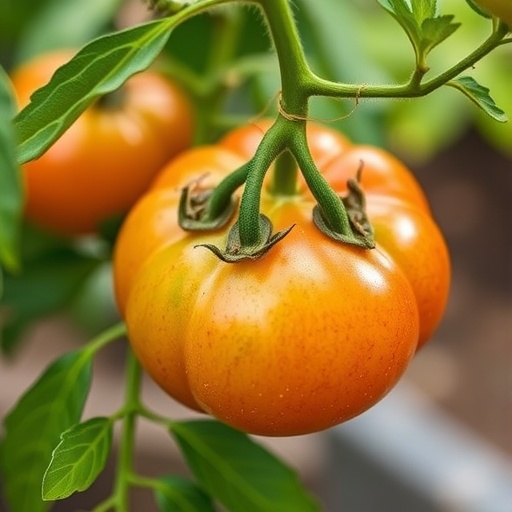A groundbreaking study published in the journal Discover Agriculture sheds light on innovative solutions to combat one of agriculture’s most devastating pests: the Helicoverpa armigera, commonly known as the cotton bollworm. This insect, notorious for its appetite for various crops, particularly tomato, poses significant threats to agricultural productivity and food security worldwide. Researchers from Nepal, led by Khanal, Sapkota, and Suwal, have embarked on an ambitious exploration into the efficacy of biorational pesticides that promise a more sustainable approach to pest management.
The urgency of this research stems from the increasing resistance of Helicoverpa armigera to conventional chemical pesticides. The reliance on synthetic chemicals, while effective at first, has led to numerous environmental and health concerns, including pesticide resistance, ecological imbalance, and adverse effects on non-target species. The need for sustainable alternatives has never been more pressing, as farmers seek solutions that safeguard their crops without compromising the environment or human health.
In their study, Khanal and team meticulously evaluated various biorational pesticides derived from natural sources. These substances, which include plant extracts and microbial agents, offer a dual advantage: they are typically less harmful to beneficial insects and animals and they pose a reduced risk to the environment compared to their synthetic counterparts. This research marks a pivotal point in the quest for sustainable agricultural practices, targeting the very root of pest problems while nurturing ecological balance.
The experimental design utilized in this investigation was both comprehensive and methodical. Researchers deployed a series of controlled field trials on tomato crops, assessing not only the effectiveness of the biorational pesticides in managing pest populations but also their impact on crop yield and overall plant health. By improving the management of Helicoverpa armigera, farmers hope to enhance not only the quality of their produce but also their financial stability.
The initial findings from the field trials are encouraging. The biorational pesticides exhibited significant effectiveness in lowering the population of Helicoverpa armigera. Farmers reported a marked decrease in pest-related losses, which directly translated into increased tomato yields. These early successes underscore the potential of natural pesticide alternatives in real-world agricultural settings, challenging the long-standing dominance of synthetic chemicals in pest management strategies.
Additionally, the researchers took care to monitor various ecological parameters during the study. They conducted assessments of non-target organisms, such as beneficial insects and soil microbiota, to ensure that the introduction of these biorational pesticides does not disrupt the delicate balance of the ecosystem. Their findings indicate that when biorational pesticides are used judiciously, they can effectively manage pest populations without negatively impacting the surrounding wildlife or agricultural biodiversity.
The broader implications of this research extend beyond the immediate benefits to tomato farmers in Nepal. The successful application of sustainable pest management strategies can serve as a model for other regions grappling with similar challenges posed by Helicoverpa armigera and other agricultural pests. This research not only highlights the importance of innovation in agricultural practices but also promotes global conversations around sustainable farming, food security, and ecological stewardship.
Moreover, the study emphasizes the need for collaboration among scientists, farmers, and policymakers to facilitate the broader adoption of biorational pesticides. By connecting agricultural practitioners with the latest research and technology, communities can work together to enhance food production sustainably. Extension services and farmer education programs will play crucial roles in disseminating these findings and ensuring that farmers are well-equipped to implement these new strategies.
As the impacts of climate change further exacerbate agricultural challenges, turning towards sustainable solutions becomes imperative. Researchers like Khanal and his team are paving the way for future studies that not only expand upon these initial findings but also explore the intersection of technology and natural pest management. Innovations such as precision agriculture and biotechnological advancements could further enhance our ability to manage pests effectively while minimizing environmental impact.
This booming field of sustainability in agriculture is also attracting increased attention from various stakeholders, including government entities and non-profit organizations focused on food security. Their support can facilitate access to resources and funding vital for ongoing research, helping ensure that sustainable pest management remains a priority within the agricultural sector.
In conclusion, the study led by Khanal et al. provides critical insights into the potential of biorational pesticides as a sustainable alternative for pest management, particularly concerning the pervasive Helicoverpa armigera. It holds the promise of transforming agricultural practices to be more aligned with ecological principles and farmer needs. As the agricultural community grapples with the ongoing challenges of pest control and environmental sustainability, studies like this are not merely useful; they are essential for fostering a future where both crops and ecosystems can thrive together.
The conversation around sustainable agriculture is just beginning, and the insights gained from this research will surely fuel further inquiry and innovation. Policymakers, scientists, and practitioners must continue working together, sharing knowledge and experiences, to enhance the resilience of agricultural systems in the face of emerging challenges.
The hope is that through rigorous research, careful execution, and dedicated collaboration, agriculture can transition towards more sustainable practices, leading to healthier ecosystems and robust food systems worldwide.
Subject of Research: Evaluation of sustainable biorational pesticides for managing Helicoverpa armigera on tomato in Nepal.
Article Title: Evaluation of sustainable biorational pesticides for managing Helicoverpa armigera (Lepidoptera: Noctuidae) on tomato in Nepal.
Article References:
Khanal, D., Sapkota, U., Suwal, G. et al. Evaluation of sustainable biorational pesticides for managing Helicoverpa armigera (Lepidoptera: Noctuidae) on tomato in Nepal.
Discov Agric 3, 199 (2025). https://doi.org/10.1007/s44279-025-00308-2
Image Credits: AI Generated
DOI: 10.1007/s44279-025-00308-2
Keywords: Helicoverpa armigera, biorational pesticides, sustainable agriculture, pest management, tomato crops.
Tags: biorational pesticides for tomatoesecological pest management strategiesenvironmental impact of pesticidesfood security and agricultureHelicoverpa armigera controlinnovative agricultural practicesnatural pest control solutionsorganic pest control methodsreducing pesticide resistancesustainable farming practicessustainable pest managementtomato crop protection techniques





